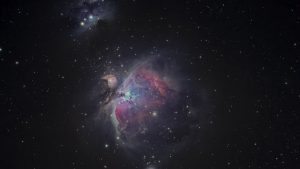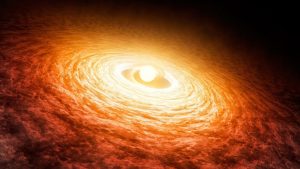Roskosmos Unveils First Physical Model of Planned Russian-Built Space Station
Russia’s space agency on Monday unveiled for the first time a physical model of what a planned new Russian-built space station will look like, suggesting Moscow is serious about abandoning the International Space Station (ISS) and going it alone.Russia, in the throes of what some Kremlin hardliners believe is an historic rupture with the West sparked by sanctions imposed over what Moscow calls its “special military operation” in Ukraine, is rushing to reduce its dependency on Western nations and forge ahead on its own or cooperate with countries like China and Iran.The West, which has accused Russia of prosecuting an unprovoked imperial-style war of aggression against Ukraine, has hit the Russian economy with sanctions designed to starve Moscow of technology, know-how and funds.Russia’s national space agency Roskosmos presented a model of the planned space station, dubbed “ROSS” by Russian state media, on Monday at “Army-2022”, a military-industrial exhibition outside Moscow.Yuri Borisov, whom President Vladimir Putin appointed last month to head Roskosmos, has said Russia will quit the ISS after 2024 and is working to develop its own orbital station.Launched in 1998, the ISS has been continuously occupied since November 2000 under a US -Russian-led partnership that also includes Canada, Japan and 11 European countries.NASA, which is keen to keep the ISS operating until 2030, says it has not yet received official confirmation of Russia’s planned withdrawal and had previously understood that Moscow would continue to participate until 2028.Roskosmos said in a statement that the new space station would be launched in two phases, without giving dates.The first phase would see a four-module space station start operating. That would later be followed by a further two modules and a service platform, it said. That would be enough, when completed, to accommodate up to four cosmonauts as well as scientific equipment.Roskosmos has said the new station would afford Russian cosmonauts a much wider view of the Earth for monitoring purposes than they enjoy in their current segment.Although designs for some of the new station already exist, design work is still underway on other segments.Russian state media have suggested that the launch of the first stage is planned for 2025-26 and no later than 2030. Launch of the second and final stage is planned for 2030-35, they have reported.The space station, as currently conceived, would not have a permanent human presence but would be staffed twice a year for extended periods.Dmitry Rogozin, the previous head of Roskosmos and a hardliner known for his tough statements against the West, has suggested that the new space station could fulfil a military purpose if necessary.

Russia’s space agency on Monday unveiled for the first time a physical model of what a planned new Russian-built space station will look like, suggesting Moscow is serious about abandoning the International Space Station (ISS) and going it alone.
Russia, in the throes of what some Kremlin hardliners believe is an historic rupture with the West sparked by sanctions imposed over what Moscow calls its “special military operation” in Ukraine, is rushing to reduce its dependency on Western nations and forge ahead on its own or cooperate with countries like China and Iran.
The West, which has accused Russia of prosecuting an unprovoked imperial-style war of aggression against Ukraine, has hit the Russian economy with sanctions designed to starve Moscow of technology, know-how and funds.
Russia’s national space agency Roskosmos presented a model of the planned space station, dubbed “ROSS” by Russian state media, on Monday at “Army-2022”, a military-industrial exhibition outside Moscow.
Yuri Borisov, whom President Vladimir Putin appointed last month to head Roskosmos, has said Russia will quit the ISS after 2024 and is working to develop its own orbital station.
Launched in 1998, the ISS has been continuously occupied since November 2000 under a US -Russian-led partnership that also includes Canada, Japan and 11 European countries.
NASA, which is keen to keep the ISS operating until 2030, says it has not yet received official confirmation of Russia’s planned withdrawal and had previously understood that Moscow would continue to participate until 2028.
Roskosmos said in a statement that the new space station would be launched in two phases, without giving dates.
The first phase would see a four-module space station start operating. That would later be followed by a further two modules and a service platform, it said. That would be enough, when completed, to accommodate up to four cosmonauts as well as scientific equipment.
Roskosmos has said the new station would afford Russian cosmonauts a much wider view of the Earth for monitoring purposes than they enjoy in their current segment.
Although designs for some of the new station already exist, design work is still underway on other segments.
Russian state media have suggested that the launch of the first stage is planned for 2025-26 and no later than 2030. Launch of the second and final stage is planned for 2030-35, they have reported.
The space station, as currently conceived, would not have a permanent human presence but would be staffed twice a year for extended periods.
Dmitry Rogozin, the previous head of Roskosmos and a hardliner known for his tough statements against the West, has suggested that the new space station could fulfil a military purpose if necessary.



